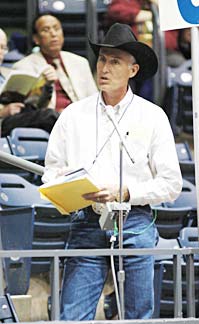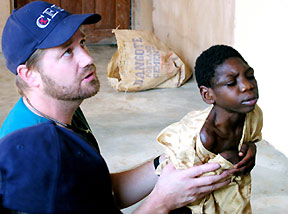Updated: 11/02/07
|
| Messengers to the Baptist General Convention of Texas annual meeting vote by raising their ballot packets. (PHOTO/Robert Rogers/Baylor University) |
First woman BGCT president
elected, budget approved
By Ken Camp
Managing Editor
MARILLO—Messengers to the Baptist General Conven-tion of Texas annual meeting narrowly elected the first woman president of the state convention—and continued a two-decade string of officers endorsed by the moderate Texas Baptists Committed organization.
By about a two-to-one margin, messengers approved a $50.1 million Cooperative Program budget, and they overwhelmingly rebuffed a move to consider a “no-confidence” vote in the BGCT Executive Board. They also approved creation of a committee to recommend a “shared vision” for the convention—but without the 2008 completion deadline or the 2020 target goal proposed by the original maker of the motion.
 |
| Joy Fenner presides over a session of the Baptist General Convention of Texas annual meeting in her capacity as first vice president. She was elected the convention’s first female president in Amarillo. (PHOTO/Robert Rogers/Baylor University) |
The annual meeting drew 2,027 messengers and 1,098 visitors from 601 churches. The 2006 meeting in Dallas attracted 1,990 messengers and 820 guests—the lowest attendance in more than 50 years.
Fenner, 72, a former missionary to Japan, executive director emeritus of Woman’s Mission-ary Union of Texas and incumbent BGCT first vice president, was elected over Canyon pastor David Lowrie. Fenner—a member of Gaston Oaks Baptist Church in Dallas—received 900 votes (52 percent), compared to 840 (48 percent) for Lowrie.
Fenner’s election marked another in a series of presidential elections demonstrating BGCT diversity. In recent years, the state convention has elected its first Hispanic president and its first African-American president.
Many convention messengers attributed the close margin of Fenner’s election less to her gender and more to dissatisfaction with current BGCT leadership, as well as the other nominee’s West Texas ties.
In nominating Fenner, Steve Wells from South Main Baptist Church in Houston acknowledged Texas Baptists “have been going through a difficult time,” and he insisted Fenner could provide the “clear and courageous voice” needed. Fenner “knows this is a new day that needs a new vision,” Wells said.
Lowrie—who would have been the first second-generation BGCT president—had been endorsed by several Baptist bloggers who called for an end to what they saw as the Texas Baptists Committed organization’s control over the BGCT.
They also called for change in BGCT leadership in light of a church-starting fund scandal in the Rio Grande Valley, a recent round of layoffs at the Baptist Building in Dallas and a ruling by the presiding officer at the 2006 BGCT annual meeting that essentially al-lowed the Executive Board to trump the decision-making authority of convention messengers.
Lowrie particularly voiced concern that since the majority of BGCT churches continue to relate to the Southern Baptist Convention, he wanted to see members of loyal BGCT churches with SBC ties given a more prominent role in BGCT life.
 |
| Gary Morgan, pastor and messenger from the Cowboy Church of Ellis County, questions why the missions, evangelism and ministry area of the BGCT budget showed a reduction. (PHOTO/Eric Guel) |
In a news conference after the election results were announced, Lowrie pledged his continuing loyalty to the BGCT and encouraged messengers who voted for him to follow suit.
“You don’t create a future by pulling out,” he said. “You create a future by being engaged in the process.”
Joking with reporters, Lowrie added: “I feel like the winner. I accomplished my goals, but I don’t have to be president.”
Fenner could help promote unity among Texas Baptists by ensuring that people who have not served previously be appointed to places of service on BGCT boards and committees, he asserted.
Communicating with 5,700 diverse churches presents a challenge, Fenner noted, and she indicated Texas Baptists who believe they have not been represented adequately have a responsibility to help keep the lines of communication open.
“We have tremendously gifted people in our churches,” she said. “Help us know who they are and what they bring to the table” in terms of talents, experience, knowledge and ability.
Messengers also elected Mike Massar, pastor of First Baptist Church in Tyler, as first vice president and Jeff Raines, associate pastor at First Baptist Church in Amarillo, as second vice president. Massar received 967 votes, compared to 257 for Lee Saunders, minister of church development at Garden Oaks Baptist Church in Houston. Raines was unopposed.
During discussion of the 2008 budget, several messengers went to the microphones to raise questions—particularly regarding decreased funding for the missions, evangelism and ministry section.
Gary Morgan from the Cowboy Church of Ellis County called the reduced funding for that area “almost unconscionable.”
The annual meeting voted not to consider a motion by Michael Chancellor from Crescent Heights Baptist Church in Abilene calling for messengers to give the BGCT Executive Board directors a vote of “no confidence.”
With only a smattering of dissenting votes, messengers instead approved a motion by Dan Malone of First Baptist Church in El Paso objecting to the consideration of the “no-confidence” motion.
Ed Jackson from First Baptist Church in Garland introduced a motion calling on the BGCT president and the Executive Board chair to appoint a committee with no more than 25 members to consider a “shared vision” for the BGCT for 2020.
His original motion called on the committee to bring interim reports to the Executive Board in its February, May and September meetings next year and to bring a final report to the 2008 BGCT annual meeting.
It also gave specific charges to the committee about addressing the relationship between the BGCT and its institutions, setting priorities, studying changing missions strategies and analyzing “the impact of innovation on our ministries and the sustainability of all programs.”
Philip Wise of Lubbock, chair of the committee on convention business, brought a substitute motion that abbreviated the language of the original motion, expanded the number of people naming the committee to include all convention officers and extended the deadline for a final report to “no later than the 2009 annual meeting.” It also made no mention of the 2020 date.
 |
| Executive Board Chair Bob Fowler reports on a statement adopted by the board regarding its role in relation to the convention in annual session. (PHOTO/Eric Guel) |
Messengers to the annual meeting approved the substitute motion from Wise’s committee.
At the recommendation of Wise’s committee, two motions introduced by Daniel Downey from First Baptist Church in Memphis were referred to the Executive Board. One called on the Executive Board’s administrative subcommittee to examine the chief operating officer’s position to determine “if it is really vital or necessary to the operation of BGCT ministries since the recent reorganization and consolidation of BGCT departments.”
The other motion—which a sizeable minority of messengers wanted to vote on to show the will of the body—called on the Executive Board to examine the necessity and effectiveness of the Baptist Building’s service center.
The presiding chair ruled out of order a motion by Kyle Clayton of First Baptist Church in Farwell calling for biographical information about all officer nominees to be provided to messengers. Since nominations are allowed from the floor of the annual meeting according to the BGCT governing documents, advance preparation of a resume of all possible nominees would be impossible, the chair determined.
Messengers also approved a special agreement with Baptist Child & Family Services to allow the agency to elect two-thirds of its trustee board and for the BGCT to elect one-third of the board.
In other business, messengers gave initial approval to a constitutional amendment that will clarify the decision-making authority of the convention in annual session.
The amendment to Article VII, Section 1 of the BGCT constitution says, “The Executive Board shall have charge and control, except when otherwise directed by the convention, of all the work of the convention, including missions, education and beneficence, in the interim between its sessions.”
The motion of clarification was prompted by outcry following a ruling by the presiding officer at the 2006 BGCT annual meeting, who said a decision by the Executive Board in a called meeting immediately prior to the annual meeting “pre-empted” action by messengers to the state convention. Constitutional amendments require two-thirds approval at two consecutive annual meetings.
Messengers to the annual meeting also approved a resolution that Texas Baptists “encourage, promote and support Baptist ministries that show the love of Christ in practical ways to immigrants within the confines of the law and according to biblical mandates.”
They also approved a resolution commending strategies that strengthen early childhood education, drop-out prevention, language ministry, adult literacy and higher education and encouraging churches and institutions to “provide academic and other support to at-risk students, including forming partnerships with schools.”
Other motions included appreciation to Charles Wade, who retires as BGCT executive director Jan. 31, 2008, as well as recognition of the 300th anniversary of Baptist associations in North America and thanks to the hosts of the annual meeting and the officers of the convention.
News of religion, faith, missions, Bible study and Christian ministry among Baptist churches, in Texas, the BGCT, the nation and around the world.





